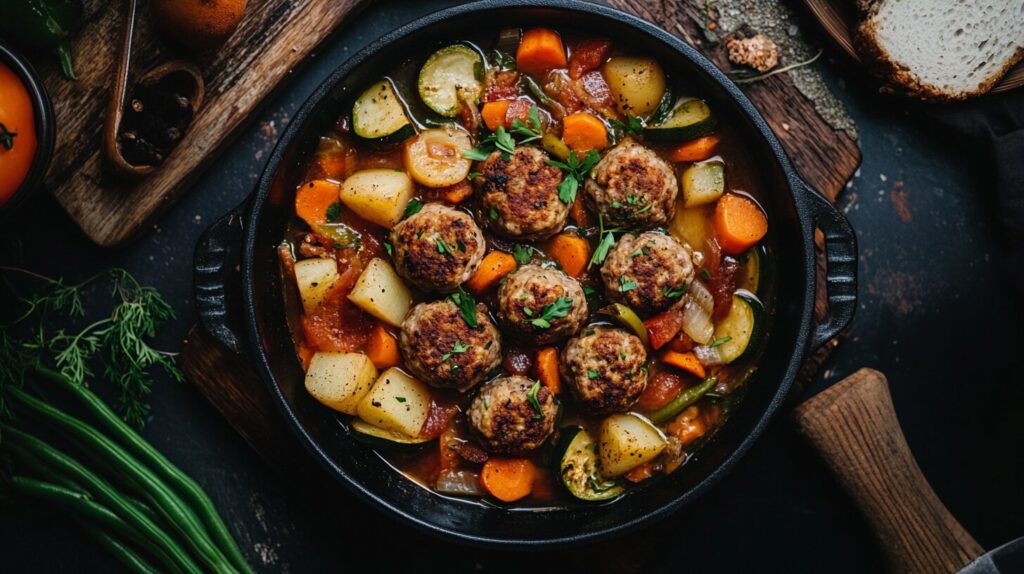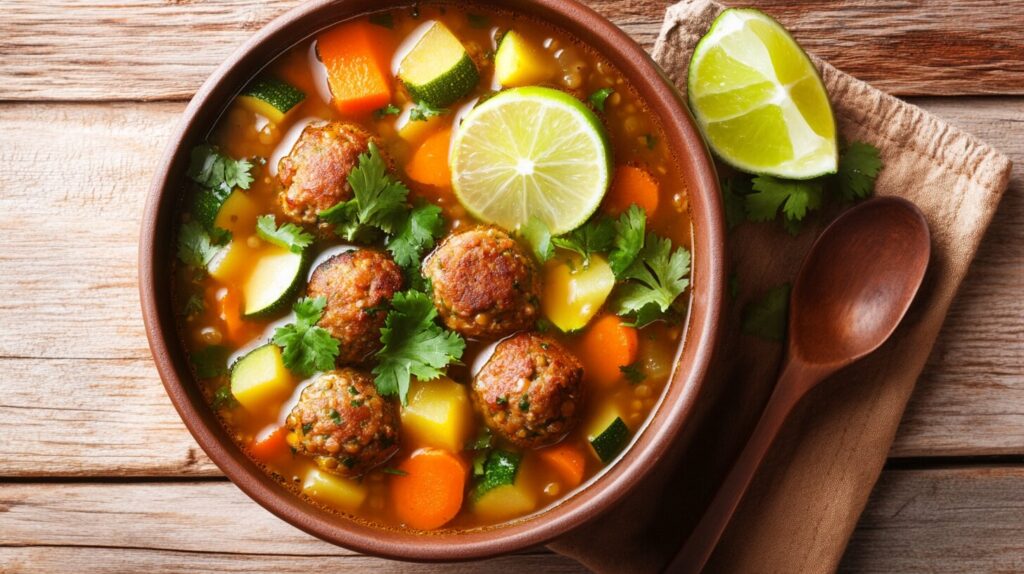
Table of Contents
Protein in Albondigas Soup makes this beloved dish not only flavorful but also nutritious. This cherished dish in Mexican cuisine has roots tracing back to Spain. The term albondigas means “meatballs” in Spanish, originating from the Arabic word al-bunduq, meaning “hazelnut” or “small round object.” For a deeper dive into the term’s history, read our Albondigas meaning guide.
Introduced during the Moorish occupation of Spain, these hearty meatballs eventually made their way to Mexico, where they were adapted with local ingredients and flavors. The soup is now a staple in Mexican households, often served during cold seasons or at family gatherings. To make sure your Albondigas stay fresh, learn how long Albondigas last in the fridge.
Its comforting and rich flavors symbolize warmth, hospitality, and tradition, making it a beloved dish that transcends generations.
Why Albondigas Soup is a Beloved Comfort Food
The appeal of Albondigas Soup lies in its simplicity, versatility, and heartwarming nature. This dish is a perfect combination of savory meatballs, nutrient-rich vegetables, and flavorful broth. It satisfies the palate while offering essential nutrients, making it a go-to comfort food. Families often pass down recipes, each with its unique twist. Whether served during illness for its nourishing qualities or enjoyed at a festive gathering, Albondigas Soup brings people together. Its ability to adapt to various tastes and dietary needs ensures it remains a timeless and popular dish.
Understanding Albondigas Soup
What Exactly is Albondigas Soup?
Albondigas Soup is a traditional meatball soup featuring a broth-based foundation and various vegetables. The meatballs are typically made from ground beef or turkey, seasoned with garlic, cumin, onion, and herbs like cilantro or mint. The broth is often a blend of chicken or beef stock, flavored with tomatoes and spices. Common vegetables include carrots, potatoes, zucchini, and green beans. The result is a nutrient-dense soup that is both hearty and flavorful. Variations exist across regions, with each family adding unique ingredients, making it a flexible and customizable dish.
Key Ingredients in Albondigas Soup
The primary components of Albondigas Soup include:
- Meatballs: Traditionally made from ground beef, turkey, or pork. These are seasoned with garlic, onion, cumin, mint, and sometimes rice.
- Broth: A base of chicken, beef, or vegetable stock seasoned with tomatoes and spices.
- Vegetables: Carrots, potatoes, zucchini, and green beans are common. These add fiber, vitamins, and texture.
- Seasonings: Garlic, cilantro, cumin, and mint give the soup its distinctive flavor profile.
- Optional Additions: Rice, chili peppers, and lime juice can be added for extra texture and zest.
These ingredients blend harmoniously to create a balanced and satisfying dish.
Variations of Albondigas Soup Around the World
While Albondigas Soup is rooted in Mexican tradition, variations of meatball soup can be found worldwide. In Spain, the soup often includes saffron and peas. In the Middle East, kofte soup features spiced meatballs in a tangy broth. Turkey’s Izmir köfte includes tomato-based broth with potatoes and peppers. In the Philippines, almondigas uses a combination of pork meatballs and noodle soup. These global adaptations highlight the universal appeal of meatball soups, each infused with local spices, cooking methods, and cultural influences. Each version offers a unique take on a comforting classic.
The Importance of Protein in Your Diet
Why is Protein Essential for Health?
Protein is a macronutrient critical for various bodily functions, including tissue repair, muscle growth, and enzyme production. It plays a role in maintaining skin, hair, and bone health. Proteins are made up of amino acids, some of which the body cannot produce on its own, making dietary intake essential. Protein also helps with immune function, hormone regulation, and nutrient transportation. Including protein-rich foods in your diet supports overall well-being, promotes recovery after exercise, and helps maintain a healthy metabolism. For those looking to build muscle or manage weight, adequate protein intake is essential.
Recommended Daily Protein Intake
The Recommended Dietary Allowance (RDA) for protein varies depending on age, sex, and activity level. For the average adult, the RDA is 0.8 grams of protein per kilogram of body weight. For example, a 70 kg (154 lb) adult would need about 56 grams of protein daily. Athletes, pregnant women, and those recovering from illness may require higher amounts, ranging from 1.2 to 2.0 grams per kilogram. Including balanced sources of protein like lean meats, legumes, dairy, and fish ensures optimal health. Albondigas Soup, with its combination of meat and vegetables, can help meet daily protein goals.
Protein Content of Meatballs in Albondigas
Types of Meat Commonly Used in Albondigas Meatballs
The choice of meat in Albondigas greatly influences the protein content. Traditional recipes often use ground beef, offering about 20-25 grams of protein per 100 grams. If you’re interested in learning more about different beef cuts and their uses, check out our guide on understanding beef tips.
Ground turkey is a leaner option, providing about 19-21 grams per 100 grams. Pork, another alternative, contains 18-22 grams per 100 grams. For those seeking a lighter version, chicken can also be used, yielding similar protein content. Each type of meat not only affects protein levels but also adds unique flavors and textures. Choosing lean meats can help reduce fat content while maintaining high protein.
Protein Content of Beef Meatballs

Beef is the most common choice for Albondigas meatballs due to its rich flavor and protein content. A serving of beef meatballs made from 90% lean ground beef provides approximately 22 grams of protein per 100 grams. Higher-fat cuts may slightly decrease the protein percentage but enhance the flavor. Including ingredients like rice or breadcrumbs may dilute the protein concentration, but beef remains a robust source of protein in the soup. Opting for lean beef ensures a protein-rich meal while keeping fat content moderate.
How Ground Turkey Affects Protein Content
Ground turkey offers a lean and nutritious alternative to beef. A 100-gram serving of ground turkey typically provides 21 grams of protein. This option is lower in fat, making it ideal for those focused on heart health or weight management. While turkey meatballs might have a milder flavor compared to beef, they readily absorb seasonings and spices. Incorporating herbs like mint or cilantro can enhance the taste without adding calories. Ground turkey maintains the high protein levels needed for muscle repair and overall wellness, making it a valuable ingredient in Albondigas Soup.
Vegetarian Options and Their Protein Contribution

For those who prefer plant-based diets, vegetarian Albondigas can be made using beans, lentils, or textured vegetable protein (TVP). A 100-gram serving of lentil-based meatballs provides about 9 grams of protein. Black beans offer approximately 8 grams per 100 grams, while TVP can deliver up to 12 grams. Combining these ingredients with breadcrumbs, eggs, or flaxseed helps achieve a meatball-like consistency. While these alternatives may offer lower protein content than meat, they are rich in fiber and nutrients. Adding quinoa or chickpeas can boost protein levels in vegetarian versions of Albondigas.
Broth and Vegetable Contributions
Protein in Broth: Chicken, Beef, or Vegetable?
The type of broth used in Albondigas Soup can slightly influence its protein content. Chicken broth typically contains around 1-2 grams of protein per cup (240 ml). Beef broth offers a similar range, with about 2-3 grams per cup due to the collagen derived from beef bones. Vegetable broth, however, generally contains less than 1 gram of protein per cup. While the protein contribution of broth is minimal compared to meatballs, the nutrients and minerals in homemade bone broth can support joint health and digestion. Opting for bone broth can also add collagen, which may enhance skin and joint health.
Do Vegetables Add Significant Protein?
While the primary protein source in Albondigas Soup comes from the meatballs, the vegetables also provide a small protein boost. Common ingredients like carrots, potatoes, zucchini, and green beans contribute modest amounts of protein. For example:
- Carrots: 1 gram of protein per 100 grams
- Potatoes: 2 grams of protein per 100 grams
- Zucchini: 1 gram of protein per 100 grams
- Green Beans: 2 grams of protein per 100 grams
Though their protein content is not significant compared to meat, vegetables add essential vitamins, minerals, and fiber, contributing to the overall nutritional balance of the soup.
Calculating Total Protein in Albondigas Soup
Step-by-Step Calculation of Protein
To determine the total protein in a serving of Albondigas Soup, consider the key components:
- Meatballs: Each meatball made from beef or turkey (about 30 grams) contains roughly 6-7 grams of protein.
- Broth: One cup of chicken or beef broth adds 2 grams of protein.
- Vegetables: Mixed vegetables in a typical serving may contribute an additional 2-3 grams of protein.
For a bowl containing 4 meatballs, 1 cup of broth, and assorted vegetables, the protein content would be approximately:
- Meatballs: 4 x 6 grams = 24 grams
- Broth: 2 grams
- Vegetables: 3 grams
Total Protein: 29 grams per serving
This calculation can vary based on meat type, serving size, and additional ingredients like rice or beans.
Serving Size Considerations
Protein intake depends on portion size. A standard serving of Albondigas Soup typically includes 3-4 meatballs and 1-2 cups of broth. If you increase the number of meatballs or use larger portions of meat, the protein content rises accordingly. For individuals with higher protein needs, doubling the meatballs or adding a side of beans can boost the protein count. Adjusting serving sizes allows you to customize the soup to meet specific dietary goals.
How Cooking Methods Affect Protein Content
Cooking methods can influence the protein content of Albondigas Soup, though the changes are usually minor. Boiling or simmering meatballs in broth does not significantly reduce protein. However, overcooking may cause protein denaturation, affecting texture but not nutritional value. Frying meatballs before adding them to the broth can slightly alter their fat content without impacting protein levels. To maximize protein retention, avoid prolonged cooking times and use gentle simmering methods. This ensures the meatballs remain tender and nutrient-dense.
Comparing Albondigas Soup to Other Soups
Protein in Albondigas vs. Chicken Noodle Soup
Chicken Noodle Soup is a classic comfort food, but how does it compare to Albondigas Soup in terms of protein? A typical serving of Chicken Noodle Soup (about 1 cup) contains approximately 8-10 grams of protein. This comes mainly from the chicken pieces, which provide about 20 grams of protein per 100 grams. In comparison, Albondigas Soup with meatballs can deliver up to 25-30 grams of protein per serving. The meatballs give Albondigas a higher protein punch, making it a better option for those seeking a protein-rich meal.
How Does Albondigas Compare to Lentil Soup?
Lentil Soup is a plant-based alternative rich in protein and fiber. A standard cup of Lentil Soup contains about 12-15 grams of protein, derived from the lentils. While this is impressive for a vegetarian dish, it falls short of the 25-30 grams typically found in Albondigas Soup. However, lentils offer the benefit of being low in fat and high in fiber, making them excellent for heart health and digestion. Albondigas Soup remains superior for protein content, but Lentil Soup is a great choice for vegetarians.
Which Soup is Best for Protein Boost?
When it comes to maximizing protein, Albondigas Soup stands out due to its high meatball content. Other protein-rich soups include:
- Beef and Vegetable Soup: 20-25 grams per serving
- Chicken and Wild Rice Soup: 15-20 grams per serving
- Split Pea Soup with Ham: 15-18 grams per serving
If you’re looking to boost protein intake, Albondigas Soup is an excellent choice, especially when customized with extra meatballs or protein-rich sides.
Health Benefits of Protein-Rich Soups
Building Muscle and Strength with Albondigas
Protein is essential for muscle growth and repair, making Albondigas Soup a great option for athletes and fitness enthusiasts. The high protein content in the meatballs helps support muscle synthesis, particularly after workouts. Including protein-rich meals like Albondigas Soup in your diet can aid in maintaining muscle mass, preventing muscle loss, and improving overall strength. The soup’s combination of protein, vitamins, and minerals makes it a well-rounded meal for anyone focused on fitness goals.
Satiety and Weight Management Benefits
Protein-rich meals are known for promoting satiety, which can help with weight management. The protein in Albondigas Soup helps you feel full for longer, reducing the likelihood of overeating or snacking between meals. Additionally, the vegetables in the soup provide fiber, which further enhances satiety. Eating soups like Albondigas regularly can support healthy weight loss or maintenance by curbing hunger and providing balanced nutrition without excessive calories.
Protein and Energy Levels
Consuming adequate protein helps maintain stable energy levels throughout the day. Protein slows digestion, providing a steady release of energy. Albondigas Soup, with its balanced mix of protein, carbs, and fats, offers a sustained energy boost. Unlike high-carb meals that cause energy spikes and crashes, protein-rich dishes help maintain focus and productivity. Including Albondigas Soup in your meal plan can keep you energized and satisfied, making it ideal for busy days.
Customizing Albondigas for More Protein
Adding More Protein to Your Recipe
Boosting the protein content of Albondigas Soup is easy with a few strategic adjustments. One of the simplest ways is to add more meat to your meatball mixture. Consider using a combination of ground beef and ground turkey for a balance of flavor and lean protein. You can also incorporate protein-rich additions like quinoa, which provides 4 grams of protein per 100 grams, directly into the meatballs. Adding beans such as black beans or chickpeas to the broth will further enhance the protein content. For an extra boost, serve the soup with a side of grilled chicken breast or a hard-boiled egg, each contributing 6-8 grams of protein.
High-Protein Side Dishes to Pair with Albondigas
Pairing Albondigas Soup with high-protein side dishes can turn it into a complete, protein-packed meal. Here are some excellent options:
- Grilled Chicken Salad: Adds 20-25 grams of protein per serving.
- Quinoa Salad: Provides about 8 grams of protein per cup.
- Refried Beans: A side of beans can add 7-9 grams of protein.
- Hard-Boiled Eggs: Each egg contributes 6 grams of protein.
- Corn Tortillas with Cheese: Melted cheese adds 7-10 grams of protein per serving.
These sides not only complement the flavors of Albondigas Soup but also ensure you meet your daily protein needs.
Tips for Using High-Quality Protein Sources
When making Albondigas Soup, the quality of your protein sources matters. Opt for lean, grass-fed beef or organic ground turkey for a healthier option. These choices often have higher nutrient profiles, including more omega-3 fatty acids and fewer additives. If you’re making a vegetarian version, choose high-quality legumes like lentils or chickpeas. Adding superfoods such as chia seeds, which provide 17 grams of protein per 100 grams, can enhance the nutritional value of your meatballs. Prioritizing high-quality protein sources ensures you get the most health benefits from your meal.
Low-Protein Albondigas Options
When to Opt for Lower Protein Content
While protein is essential, there are cases where a lower-protein diet might be necessary. Individuals with certain kidney conditions or metabolic disorders may need to reduce protein intake. In such cases, you can modify Albondigas Soup by using smaller portions of meat or opting for vegetarian meatballs made from rice and vegetables. Reducing the number of meatballs per serving and using a lighter broth can also lower protein content while maintaining flavor. Always consult with a healthcare professional if you’re considering significant dietary changes.
Adjusting Ingredients for Dietary Needs
Customizing Albondigas Soup to meet specific dietary needs is simple. For a lower-protein version, replace meat with vegetables like zucchini, carrots, and potatoes. Use a vegetable broth base instead of chicken or beef broth to reduce protein content. You can also include grains like rice or barley, which provide texture without adding much protein. For those on low-sodium diets, opt for homemade broth to control salt levels. These adjustments ensure that the soup remains flavorful and satisfying while adhering to dietary restrictions.
Common Misconceptions About Albondigas Soup
Is Albondigas Always High in Protein?
Many people assume that all versions of Albondigas Soup are high in protein. While traditional recipes using beef or turkey meatballs are indeed protein-rich, variations exist that are lower in protein. For example, vegetarian versions made with rice, breadcrumbs, and vegetables contain significantly less protein. The protein content also varies based on serving size, meat quality, and additional ingredients. It’s important to consider these factors when evaluating the protein content of your Albondigas Soup.
Are All Meatball Soups Created Equal?
Not all meatball soups are created equal in terms of protein content. Different cultures have unique meatball recipes that affect the protein levels. For example:
- Italian Wedding Soup: Often includes smaller meatballs and pasta, resulting in 15-20 grams of protein per serving.
- Swedish Meatball Soup: Contains cream-based broth, which can lower protein density.
- Middle Eastern Meatball Soup: Uses lamb or chicken, providing varying protein levels depending on the meat type.
While Albondigas Soup generally offers higher protein due to its meat-heavy composition, understanding the nuances of different recipes helps you make informed dietary choices.
FAQs
How Much Protein is in a Bowl of Albondigas Soup?
A standard bowl of Albondigas Soup containing 4 meatballs, broth, and vegetables typically provides 25-30 grams of protein. The exact amount can vary based on the type of meat used, the number of meatballs, and the addition of other protein-rich ingredients like beans.
Is Albondigas Soup a Good Source of Protein for Athletes?
Yes, Albondigas Soup is an excellent source of protein for athletes. The meatballs offer high-quality protein essential for muscle repair and growth. Adding extra meatballs or pairing the soup with a protein-rich side dish can further enhance its nutritional value, making it ideal for post-workout recovery.
Can I Make Albondigas Soup Without Meat and Still Get Protein?
Absolutely! Vegetarian versions of Albondigas Soup can provide protein by using plant-based ingredients like lentils, black beans, or textured vegetable protein (TVP). While these alternatives offer less protein than meat, they are still nutritious and satisfying.
Does the Cooking Method Affect Protein Levels in Albondigas?
Cooking methods have minimal impact on protein levels in Albondigas Soup. Simmering meatballs in broth preserves most of the protein. However, overcooking can affect texture. To retain protein quality, avoid boiling the meatballs for extended periods.
What is the Best Meat for High-Protein Albondigas?
Lean ground beef (90% lean) and ground turkey are excellent choices for high-protein Albondigas. These meats provide around 20-25 grams of protein per 100 grams while keeping fat content moderate. Combining different meats can enhance flavor and protein density.
How Can I Track the Protein Content in Homemade Soup?
To track protein content in homemade Albondigas Soup, weigh the ingredients and use nutritional databases or apps. Calculate the protein for each component (meat, broth, vegetables) and sum the totals. This approach helps ensure accurate tracking for dietary goals.
Conclusion
Albondigas Soup: A Delicious and Protein-Rich Meal
Albondigas Soup is more than just a comforting dish—it’s a protein-packed meal that supports muscle growth, satiety, and overall health. With its combination of savory meatballs, nutrient-rich vegetables, and flavorful broth, it offers balanced nutrition in every bowl. Whether you stick to the traditional recipe or customize it for higher or lower protein content, Albondigas Soup is versatile and satisfying. Including this hearty soup in your meal plan ensures you enjoy a delicious, nutrient-dense option that caters to your dietary needs.
